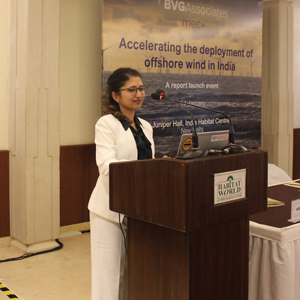 India, with its ambitious goal of achieving net-zero emissions by 2070, is emerging as a pivotal player in the offshore wind (OSW) energy sector. Demonstrating a robust commitment to renewable energy transition, the nation has set an ambitious OSW leasing target of 37GW by 2030. Initiatives like the Facilitating Offshore Wind in India (FOWIND) project and the First Offshore Wind Project of India (FOWPI) have been instrumental in conducting extensive research, laying the groundwork for the future development of OSW projects. The government’s proactive stance is evident through the publication of comprehensive reports, successful attraction of investor interest, and the initiation of essential frameworks. Collaborations with international entities such as the European Union and the World Bank Group have further enriched the landscape by bringing valuable expertise and knowledge.
India, with its ambitious goal of achieving net-zero emissions by 2070, is emerging as a pivotal player in the offshore wind (OSW) energy sector. Demonstrating a robust commitment to renewable energy transition, the nation has set an ambitious OSW leasing target of 37GW by 2030. Initiatives like the Facilitating Offshore Wind in India (FOWIND) project and the First Offshore Wind Project of India (FOWPI) have been instrumental in conducting extensive research, laying the groundwork for the future development of OSW projects. The government’s proactive stance is evident through the publication of comprehensive reports, successful attraction of investor interest, and the initiation of essential frameworks. Collaborations with international entities such as the European Union and the World Bank Group have further enriched the landscape by bringing valuable expertise and knowledge.By Shovana Talukdar, Senior Consultant, BVG Associates
Despite setting ambitious targets and launching promising initiatives, the actual deployment of offshore wind (OSW) projects in India is yet to materialise. While commendable progress has been made over recent years, there exist significant gaps in policies, frameworks and implementation capabilities when compared with established OSW markets. A recent report led by BVG Associates with support from MEC+ sheds light on these gaps, identifying hindrances to OSW acceleration in India. The report draws insights from various established and emerging OSW markets and Indian stakeholder dialogues, offering strategic and practical recommendations for the successful establishment of a sustainable OSW industry in India.
There are many challenges for the Indian OSW sector, requiring alignment and involvement at state and local levels. Incomplete frameworks related to seabed leasing, permitting, offtake and revenue, and grid connection create uncertainties for developers. The absence of comprehensive environmental and social impact assessment requirements and community engagement further adds complexity to the OSW development landscape in India. Addressing these challenges is deemed crucial for unlocking the full potential of OSW energy in the country.
By learning from, and considering examples from, five countries – Australia, Japan, the Netherlands, the UK and the USA (New York State) – India can adopt various aspects, including policy and frameworks, grid integration and planning, environmental and social considerations, infrastructure development, supply chain development, revenue models, and collaboration and stakeholder engagement.
India’s OSW potential is a key component of its sustainable energy future. As the nation strives to achieve ambitious renewable energy targets, bridging gaps in policies, frameworks and implementation is imperative. By learning from global OSW markets and implementing strategic recommendations, India can expedite the development of its OSW sector, positioning itself as a major player in the global and South Asian OSW market. The winds of change are blowing, and India has the opportunity to harness them for a greener and more sustainable future.









